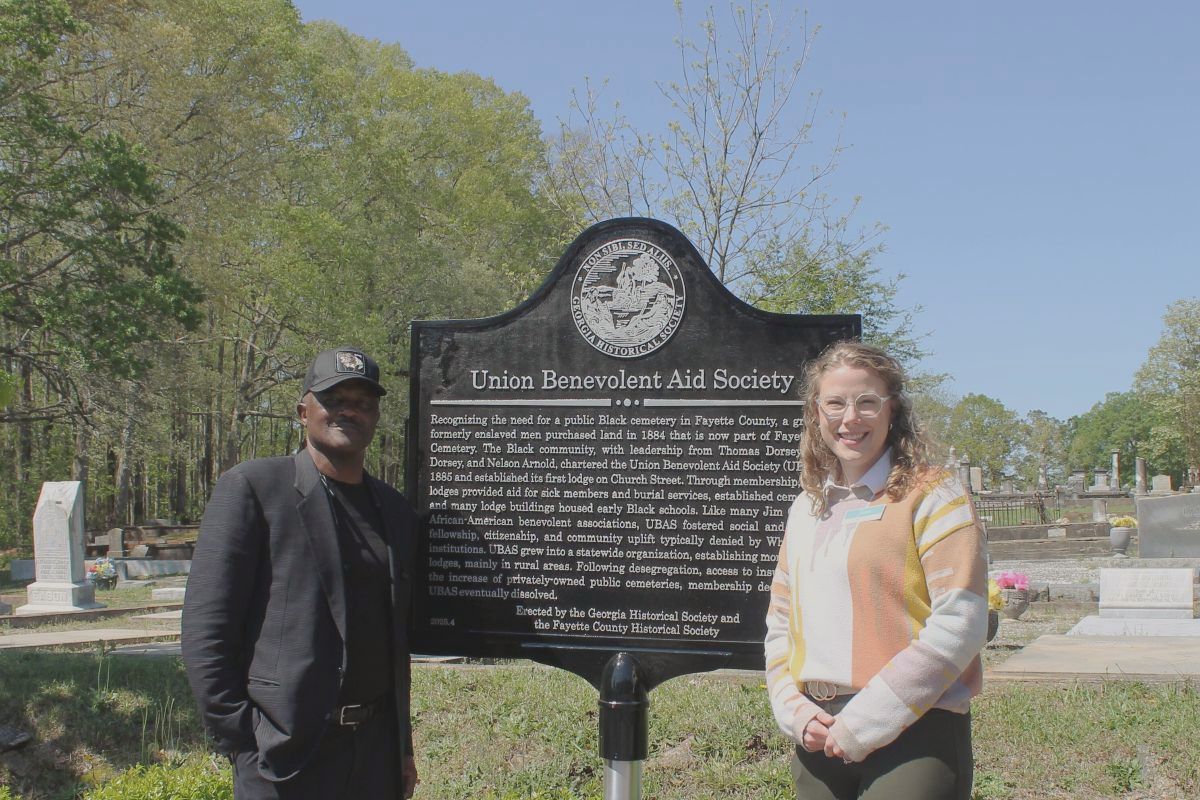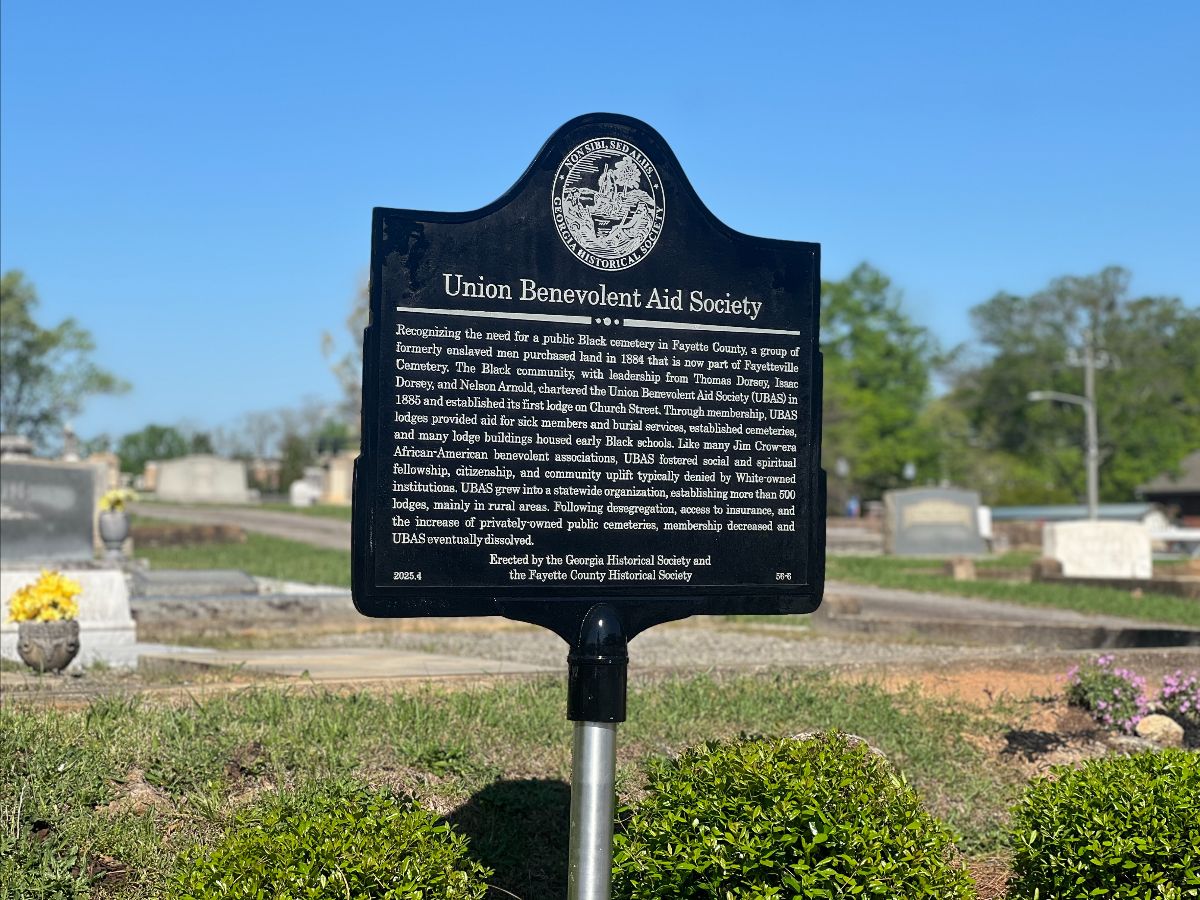912.651.2125 ext. 153 or jscoggins@georgiahistory.com

Left to right, Thomas Dorsey, Fayette County Historical Society Board member and descendant of founder Thomas Dorsey, and Breana James, Georgia Historical Society Historical Marker and Program Associate, shortly after unveiling the historical marker.
Fayetteville, GA, April 9, 2025—The Georgia Historical Society (GHS), in partnership with the Fayette County Historical Society (FCHS), dedicated a new historical marker in Fayetteville on April 9, 2025. The historical marker shares the history of the Union Benevolent Aid Society (UBAS), an African-American benevolent organization that was founded in Fayetteville in the 1880s. Enduring for over 100 years in Georgia, UBAS grew to impact communities across the state.
“The Union Benevolent Aid Society is an exceptional example showing how Black communities organized throughout the Jim Crow South to provide themselves with the necessary services such as those related to medical care and funerals,” said Breana James, GHS Historical Marker and Program Associate. “The Georgia Historical Society is pleased to have worked with the Fayette County Historical Society to share UBAS’s history and impact in the city where it was founded.”
In 1884, UBAS began with the efforts of a few formerly enslaved men in Fayette County. The men established a local Black cemetery, as there was no organized, public space for African Americans in the county to bury their loved ones. Many were buried at churches or farms on which they worked or where they were previously enslaved. The UBAS cemetery was eventually integrated with the Fayetteville Cemetery.
Only one year later in 1885, men from the same community established UBAS as a membership organization. Membership not only helped the Society establish cemeteries but also provided aid for burial services and sick members, like modern insurance plans. The first chapter, or lodge, was located on Church Street, just around the corner from the Fayetteville Cemetery. By 1955, UBAS included 526 lodges across Georgia.
“The Union Benevolent Aid Society provided communal engagement, leadership opportunities, hope, and resilience from Reconstruction through the Jim Crow era for over 100 years,” said Merryll S. Penson, Retired Executive Director, Library Services, University System of Georgia, and FCHS member. “The recognition of its part in the fabric of Georgia’s history is important for today’s citizens and tomorrow’s generations.”
After emancipation, the Freedmen's Bureau supported many, but it could not reach everyone. During the Reconstruction and Jim Crow eras, Black communities established African-American benevolent associations across the South. UBAS primarily served rural communities, fostering social and spiritual fellowship, citizenship, and community uplift in segregated Georgia.

The marker dedication took place in the Fayetteville Cemetery. In addition to James and Penson, speakers included Angela Pendleton, President, Fayette County Historical Society; The Honorable Ed Johnson, Mayor, Fayetteville; Gail Jenkins, President, Friends of the Historic Fayetteville Cemetery; and John Lynch, Fayette County Historian. Alongside James, Thomas Dorsey, Board member, Fayette County Historical Society, and descendant of founder Thomas Dorsey, unveiled the historical marker.
The marker text reads:
Union Benevolent Aid Society
Recognizing the need for a public Black cemetery in Fayette County, a group of formerly enslaved men purchased land in 1884 that is now part of Fayetteville Cemetery. The Black community, with leadership from Thomas Dorsey, Isaac Dorsey, and Nelson Arnold, chartered the Union Benevolent Aid Society (UBAS) in 1885 and established its first lodge on Church Street. Through membership, UBAS lodges provided aid for sick members and burial services, established cemeteries, and many lodge buildings housed early Black schools. Like many Jim Crow-era African-American benevolent associations, UBAS fostered social and spiritual fellowship, citizenship, and community uplift typically denied by White-owned institutions. UBAS grew into a statewide organization, establishing more than 500 lodges, mainly in rural areas. Following desegregation, access to insurance, and the increase of privately-owned public cemeteries, membership decreased and UBAS eventually dissolved.
Erected by the Georgia Historical Society and the Fayette County Historical Society
For more information about the Union Benevolent Aid Society historical marker dedication or the Georgia Historical Society marker program, please contact Jill Scoggins, Director of Public Relations and Communications, 912.651.2125 ext. 153, or jscoggins@georgiahistory.com.
###
ABOUT THE GEORGIA HISTORICAL SOCIETY
The Georgia Historical Society (GHS) is the premier independent statewide institution responsible for collecting, examining, and teaching Georgia and American history. GHS houses the oldest and most distinguished collection of materials related exclusively to Georgia history in the nation.
To learn more visit georgiahistory.com.
